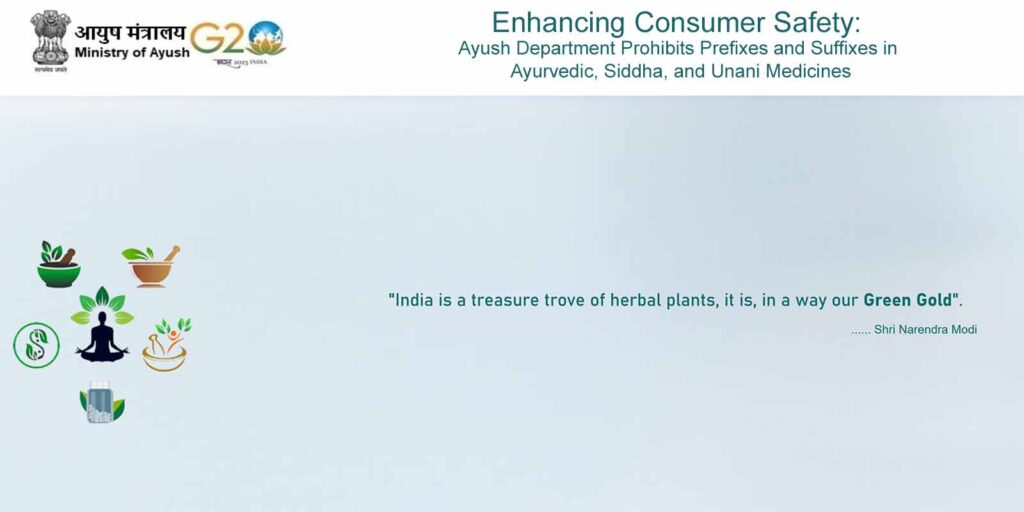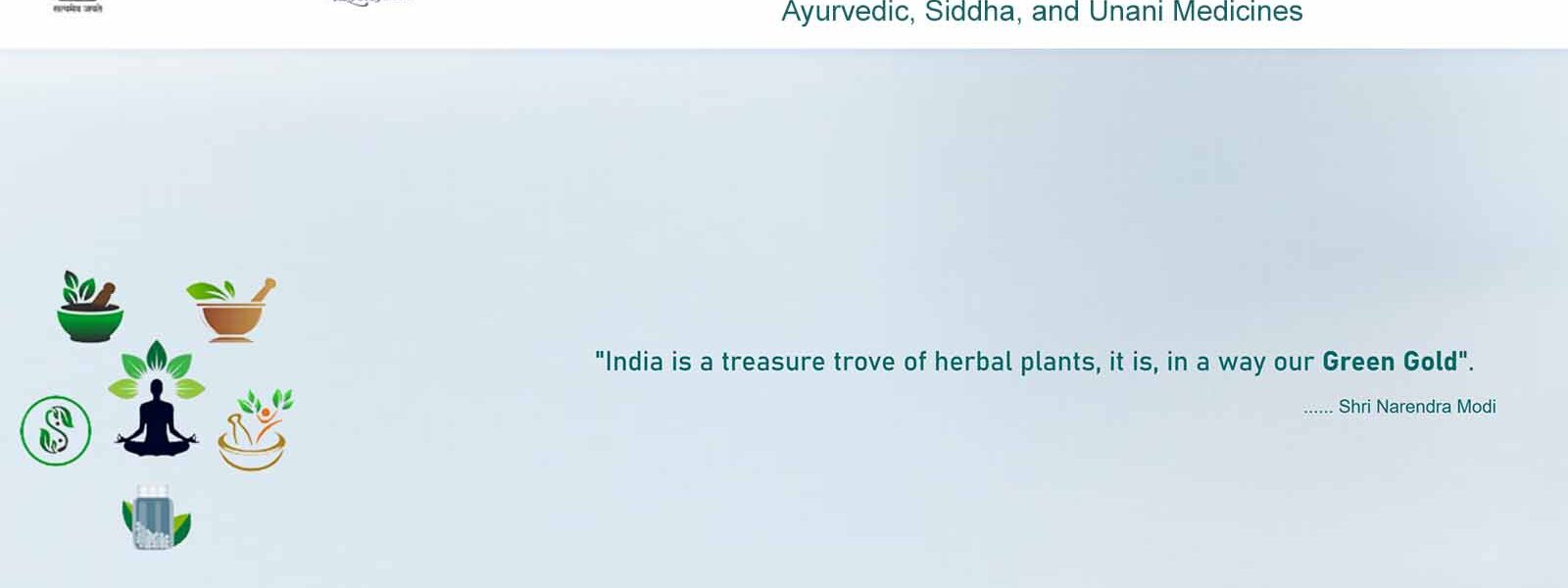Enhancing Consumer Safety: Ayush Department Prohibits Prefixes and Suffixes in Ayurvedic, Siddha, and Unani Medicines
Date: November 1, 2013
In a landmark decision to prohibit prefixes and suffixes in Ayurvedic, Siddha, and Unani Medicines and to bolster transparency and consumer safety in the pharmaceutical industry, the Department of Ayush has implemented a comprehensive prohibition on the use of prefixes and suffixes with the names of licensed Ayurvedic, Siddha, and Unani medicines. The move, outlined in the Drugs and Cosmetics (5th Amendment) Rules, 2013, comes in response to recommendations from The Ayurvedic, Siddha and Unani Drugs Technical Advisory Board and aims to streamline nomenclature, prevent mimicry, and promote a more standardized and consumer-friendly environment.

Clarity for Consumers: Eliminating Confusion in Medicine Names
Thousands of Ayurveda, Siddha, and Unani drug manufacturers across the country are now required to adjust their decades-old brand names as the Ayush department takes a bold step to ban any prefix or suffix with the name of all licensed Ayurveda, Siddha, and Unani medicines. The intent behind this regulatory measure is to discourage manufacturers from mimicking the names of popular drugs, a practice that has led to confusion among consumers.
For instance, the market features products like ‘Sona-Chandi Chyawanprash’ or ‘Chyawanprash Special,’ which mimic the widely recognized ‘Chyawanprash.’ The introduction of the Drugs and Cosmetics (5th Amendment) Rules, 2013 amends the Drugs and Cosmetics Act to enforce this prohibition, inserting sub-rules (1B) and (1C) after sub-rule (1A) in rule 157. The Ayush department’s notification specifies, “(1B) No manufacturer shall use any prefix or suffix with the name of Ayurveda, Siddha, or Unani medicine falling within the purview of clause (a) of Section 3 of the Act, except as specified in books listed in the First Schedule to the Act.”
Regulatory Framework: Rules and Amendments
The Ayurvedic, Siddha, and Unani Drugs Technical Advisory Board outlined these rules in the Drugs and Cosmetics (5th Amendment) Rules, 2013. These rules, applicable to all licensed Ayurveda, Siddha, or Unani medicines, came into force on the date of their publication in the Official Gazette. The inserted sub-rules (1B) and (1C) in rule 157 detail the specific prohibitions and exceptions.
The rules provide a one-year window for manufacturers to seek license renewal with an appropriate name conforming to the new regulations. However, the exemption clause ensures that medicines with a date of manufacture prior to the publication of the Drugs and Cosmetics (5th Amendment) Rules, 2013, remain unaffected.
The notification emphasizes that names of patent or proprietary Ayurveda, Siddha, or Unani medicines, falling under the purview of clause (h) of Section 3 of the Act, shall not resemble or mimic the names of formulations specified under clause (a) of that section and mentioned in the books listed in the First Schedule of the Act.
Industry Opposition: Balancing Tradition and Regulation
Despite the Ayush department’s commitment to enhancing consumer safety and industry transparency, there has been notable opposition from the pharmaceutical industry, particularly small and home-based manufacturers. Critics argue that disclosing certain formulations, often passed down through generations, poses a challenge and may hinder industry growth. Some manufacturers fear that the regulations could stifle their ability to retain unique practices that set them apart in the market.
The government, however, takes a firm stance on the need for transparency and consumer-friendly practices in the Ayurvedic, Siddha, and Unani systems. Officials argue that these regulatory measures are essential to combatting the proliferation of spurious drugs and ensuring the long-term success and credibility of traditional medicine systems in India.
Consumer Safety at the Forefront: Addressing Industry Concerns
The primary objective of prohibiting prefixes and suffixes is to prioritize consumer safety. The move is rooted in the understanding that a standardized naming convention and clear labeling contribute to informed decision-making by consumers. Ayush Commissioner of Andhra Pradesh, emphasizes that the notifications aim to safeguard customer interests, providing them with clear information and preventing unintentional misuse of medicines.
The industry’s concerns, while valid, must be weighed against the broader goal of creating a transparent and consumer-friendly environment. The government contends that the industry must evolve and adapt to a system that ensures the safety and well-being of consumers. The labeling system, which requires the name of the drug to be licensed before production can commence, is seen as a crucial step in bringing manufacturers under a regulated framework.
The Complex Landscape: Balancing Tradition and Modernization
The pharmaceutical industry’s challenge lies in balancing traditional practices, often guarded as family secrets, with the need for modernized, transparent, and regulated processes. A senior Ayurvedic doctor acknowledges the complexity of the issue, stating, “The problem is complex. There are many who have secret combinations that are known only to certain families. Disclosing them is very difficult, and there is too much conflict within the industry.”
However, proponents of the regulatory measures argue that for the Ayush system to flourish, it must embrace transparency and consumer-centric practices. Bringing manufacturers under a standardized labeling system is essential not only for consumer safety but also for tackling the proliferation of spurious drugs that undermine the credibility of traditional medicine systems.
Future Prospects: Building a Transparent Ecosystem
As the pharmaceutical sector grapples with these changes, the Ayush department remains steadfast in its commitment to creating a more regulated and consumer-friendly environment for traditional medicines in India. The emphasis is on building a transparent ecosystem where consumers can trust the authenticity of Ayurvedic, Siddha, and Unani medicines.
While industry players may view these regulations as restrictive, the government asserts that they are essential for the long-term sustainability of traditional medicine systems. The regulations align with a broader vision of fostering an environment where manufacturers can thrive without compromising consumer safety.
In conclusion, the prohibition on prefixes and suffixes in Ayurvedic, Siddha, and Unani medicines marks a significant stride toward ensuring clarity, transparency, and consumer safety. The delicate balance between preserving traditional practices and embracing modern regulatory frameworks is a challenge that the industry must navigate to secure its future and contribute to the credibility and growth of the Ayush systems in India.




